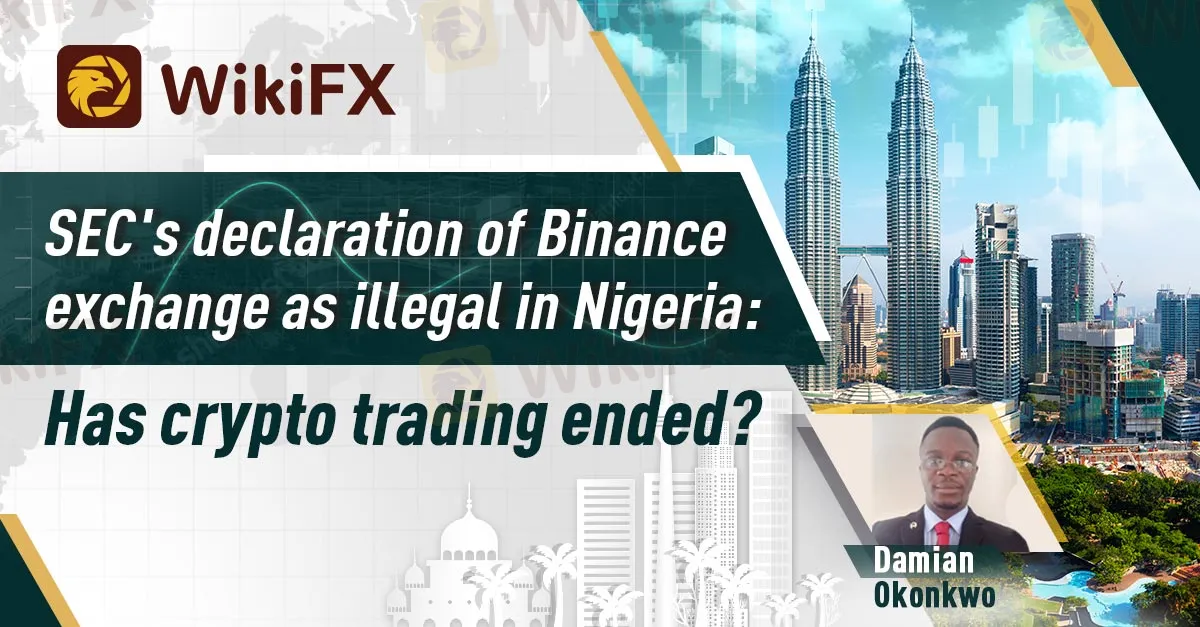简体中文
繁體中文
English
Pусский
日本語
ภาษาไทย
Tiếng Việt
Bahasa Indonesia
Español
हिन्दी
Filippiiniläinen
Français
Deutsch
Português
Türkçe
한국어
العربية
SEC's declaration of Binance exchange as illegal in Nigeria: Has crypto trading ended?
Abstract:The SEC's declaration of Binance exchange as an illegal dealer within the country has raised serious concerns among investors if this amounted to placing a ban on Cryptocurrency trading within the country. However, the body has not said so but only warned investors about the risks associated with dealing with these exchanges tagged as illegal dealers within the region.

By: Damian Okonkwo

The Nigerian Securities and Exchange Commission (SEC) had last week declared the activities of Binance Nigeria Limited, a subsidiary branch of the world's largest cryptocurrency exchange - Binance, as illegal in the country.
This therefore means that anyone who trades on Binance Nigeria Limited is doing so at their own risk and the SEC will not offer any protection in the event of losses.
The SEC's decision comes as a surprise to many, as Binance is one of the most popular and trusted cryptocurrency exchanges in the world. However, the SEC had classified the operations of this renowned Crypto exchange as illegal for not being registered or regulated by the Commission while rendering services to Nigerians.
The SEC's decision has sent shockwaves through the Nigerian cryptocurrency community, such that many investors are now wondering if this means the end of crypto trading in Nigeria.
The answer to this question is not very easy to arrive at. The SEC has not banned cryptocurrency trading outrightly within the country, but it has made it much more difficult for Nigerians to trade on regulated exchanges.
Nigerians may now turn to unregulated exchanges to trade cryptocurrency. However, this is a risky proposition. Unregulated exchanges are not subject to the same level of scrutiny as regulated exchanges and there is a greater risk of fraud and scams.
The SEC's decision is a major setback for the Nigerian cryptocurrency community. However, it is important to remember that cryptocurrency is still a new and emerging asset class. Regulators around the world will likely continue to grapple with how to best regulate cryptocurrency. In the meantime, Nigerians who are interested in trading cryptocurrency should do their research and choose a regulated exchange that they trust.
Here are some of the things to consider when choosing a cryptocurrency exchange today
Reputation: Make sure the exchange has a good reputation and has been in business for a while.
Security: Investors need to ensure that their chosen exchange has strong security measures in place to protect funds.
Regulation: The exchange should be regulated by a reputable financial authority.
Trading Fees: The exchange should have low fees so you can keep more of your profits.
Overall, it is important to remember that cryptocurrency is a volatile asset class and there is always the risk of losing money. Therefore, investors should be cautious to only invest money that they can afford to lose in cases of extreme market volatility or other failures.

Disclaimer:
The views in this article only represent the author's personal views, and do not constitute investment advice on this platform. This platform does not guarantee the accuracy, completeness and timeliness of the information in the article, and will not be liable for any loss caused by the use of or reliance on the information in the article.
Read more

Bitcoin’s Rollercoaster: Price Plunged 17.5% After a Meteoric Rise
Bitcoin experienced a sharp decline in February, marking its most significant monthly loss since June 2022. The cryptocurrency fell by 17.5%, placing it firmly in a bear market as enthusiasm surrounding digital assets waned.

President Marcos’ POGO Ban Leads Philippines Exits FATF Grey List
The Philippines exits the FATF grey list after President Marcos’ POGO ban and anti-money laundering reforms, boosting investor confidence and OFW opportunities.

Chinese Fugitives Arrested in Philippines POGO Scam Raid
Thirteen Chinese fugitives linked to POGO scams arrested in Pasay, Philippines. PAOCC reveals their crimes, raising concerns over illegal entry despite the ban.

Football Star Ronaldinho Gaúcho Launches MEME Token, Users Claim It’s a Scam
In late February 2025, Brazilian football star Ronaldinho Gaúcho began teasing a new cryptocurrency launch on his X account. On March 3, he officially released a meme token named $STAR10, which initially saw a surge in valuation, briefly reaching a market cap of $400 million. However, after the launch, the token’s price began a steep decline, leading to growing concerns and allegations of foul play.
WikiFX Broker
Latest News
How Do You Make Money in the Forex Market in March 2025
Europe’s High-Stakes Gamble: Can It Bridge the U.S.-Ukraine Divide?
Crypto Trading: New Trend among Indian Youth
Botbro Creator, Lavish Chaudhary Unveils New Project
Is TUOTENDA a cryptocurrency scam primarily targeting men over the age of 50?
Canada to Enforce Retaliatory Tariffs if U.S. Duties Persist
Unbelievable! Is the Yen Really Gaining Strength?
First UK Criminal Conviction for Unregistered Crypto ATMs Involves Over £2.5 Million
Consob Exercises MICAR Authority for the First Time, Shutting Down Unregistered Crypto Website
TD Bank Appoints Guidepost Solutions for AML Compliance Oversight
Currency Calculator






